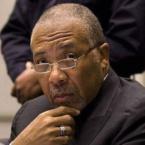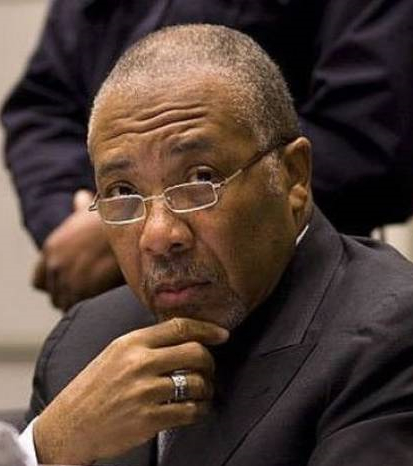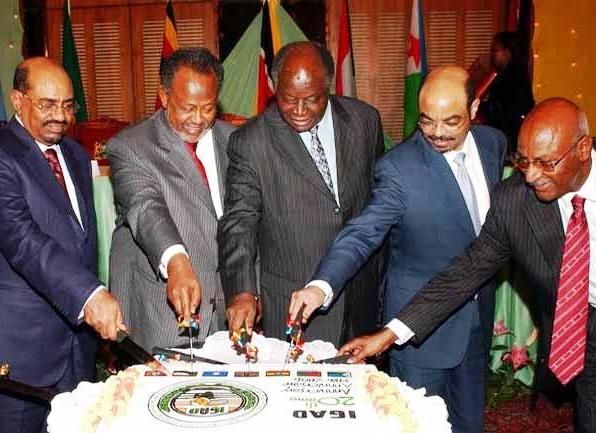Taylor Trial outcome: Liberian democracy still hampered by constitution – By Colin Waugh

Colin Waugh is the author of “Charles Taylor and Liberia: Ambition and Atrocity in Africa’s Lone Star State“ published next week in the UK by Zed books.
Liberians have gone to the polls in an election which is already mired in constitutional controversy, down-to-the-wire timing squeezes and potential logistics uncertainties. The incumbent Ellen Johnson Sirleaf, despite her huge advantage in resources and organizational power, may once again fail to win an outright victory on the first round of voting. She also contested Liberia’s last two democratic elections in 1997 and 2005, losing heavily to Charles Taylor in the former and being beaten in the first round of voting in the latter by former football star George Weah.
This time around in a field of no less than 16 candidates, George Weah is the Vice-Presidential running mate of former UN diplomat Winston A. Tubman of the Congress for Democratic Change(CDC). Charles Taylor is still detained in The Hague awaiting the verdict in his trial where he faces charges of war crimes and crimes against humanity in the Sierra Leone conflict of the late 1990s. The trial, which formally ended on May 27 this year after running for three-and a half years, has been watched eagerly by Liberians, not least by the many thousands of voters who still support the former president and ex-rebel leader to this day. Despite the passage of over four months since the conclusion of the proceedings it is likely that the court prefers to await the official ending of Liberian balloting to avoid additional disruptive controversy when the verdict is announced.
Even in the absence of a trial verdict the weeks prior to the elections have seen a heightening of the constitutional confusion which already hung in the background of Liberian politics following the June 2009 pronouncements of the congressionally-enacted Truth and Reconciliation Commission (TRC). Among the TRC’s several findings and recommendations was the censure and barring from future political candidacy of a range of prominent Liberians associated with the country’s decade-long civil war. Among those censured was the incumbent president, Ellen Johnson Sirleaf. But with the international community turning a blind eye and with the support of several others censured or recommended for trial by the TRC, President Sirleaf has chosen to ignore its findings and run for a second term. At an earlier stage she had even declared herself a non-contender for a second run at the presidency, a vow quickly forgotten when election year drew close.
These issues from the past have been compounded by the farce of the August 23 Constitutional Referendum which failed to receive a majority of participants from Liberia’s electorate and whose results are therefore officially not binding. None of the four issues up for deliberation received anything close to the two-thirds majority of those voting required for their passage. One of the constitutional proposals would have necessitated the later holding of the elections in the second week of November, a practical move to allow improved rural logistics after the ending of the rainy season, as well as more time for printing and distribution of ballot papers and other preparations. Since the measure’s failure, the National Electoral Commission and particularly the candidates themselves have been forced to scramble to first confirm their participation and finalize running mates as well as organize and execute their respective campaigns into a timetable which has become much more compressed than many had expected.
There were also two proposals on the constitutional ballot dealing with changes in the voting system and tenure for the supreme court; but the fourth proposal, to lower the residence requirement for presidential candidates from ten to five years, due to its non passage, also implies the ineligibility of six of the presidential aspirants, including the president and main opposition contender Winston Tubman. Once again, it appears that those candidates affected may ignore their country’s own legally enacted constitution and proceed with their campaigns.
Nevertheless, up until last week the issue had not yet been settled. Simeon Freeman, the candidate of the Movement for Progressive Change (MPC) has taken the matter to the Supreme Court to ask its ruling on the inclusion or otherwise of the 6 affected candidates. As so often in Liberia’s past, much is at stake and the always fragile interests of the people, as represented by their constitution and judiciary, are vulnerable to being sidelined by the country’s elite who have historically shown little respect for the rule of law and the muffled voices of the majority.
Watching all of these maneuvers and constitutional manipulations but unable to comment or participate is Charles Taylor, the former rebel strongman who won a landslide in Liberia’s 1997’s election with some 75% of the vote in an internationally supervised and UN-approved ballot. Taylor has either been in exile, detention or on trial since 2003, the year of his indictment by the internationally convened Special Court for Sierra Leone. (SCSL). The SCSL, a hybrid construct of the United Nations and the Government of Sierra Leone, was set up at the end of the latter country’s civil war to bring to justice those deemed most responsible for what was some of the most appalling bloodshed and abuse of human rights of recent times.
Taylor was the only non-Sierra Leonean tried by a court which had already indicted a dozen or so members of the rebel group the Revolutionary United Front (RUF) and other factions involved in the brutal conflict in the former British colony.
The main focus of the Taylor case was to review evidence that he and his military force, the National Patriotic Front for Liberia (NPFL), proactively took the side of the rebels in Sierra Leone in contravention of the Abuja agreement and contrary to the pronouncements of the Liberian government itself that it was not involved.
Charles Taylor’s guilt or innocence hangs on whether or not he assisted and directed the Sierra Leonean rebel group, the Revolutionary United Front (RUF), from the end of November 1996, the date of the signing of the Abuja accord an international agreement concluded in the Nigerian capital and designed to bring peace to the region – until 18 January 2002, the date when the Sierra Leone Civil War was officially brought to an end.
Over the coming two months, with a newly elected president and a long-awaited legal pronouncement on its most notorious former president, Liberians will at least have a greater measure of certainty and closure with which to face the future, no matter how imperfectly that closure will have been obtained.







Is it really correct to say that, “[the] Constitutional Referendum…failed to receive a majority of participants from Liberia’s electorate and whose results are therefore officially not binding.” ?
Since a majority of the electorate did not participate, then the referendum failed to change these laws– so the law remains the same. The results were therefore officially binding because the status quo is unchanged, correct?